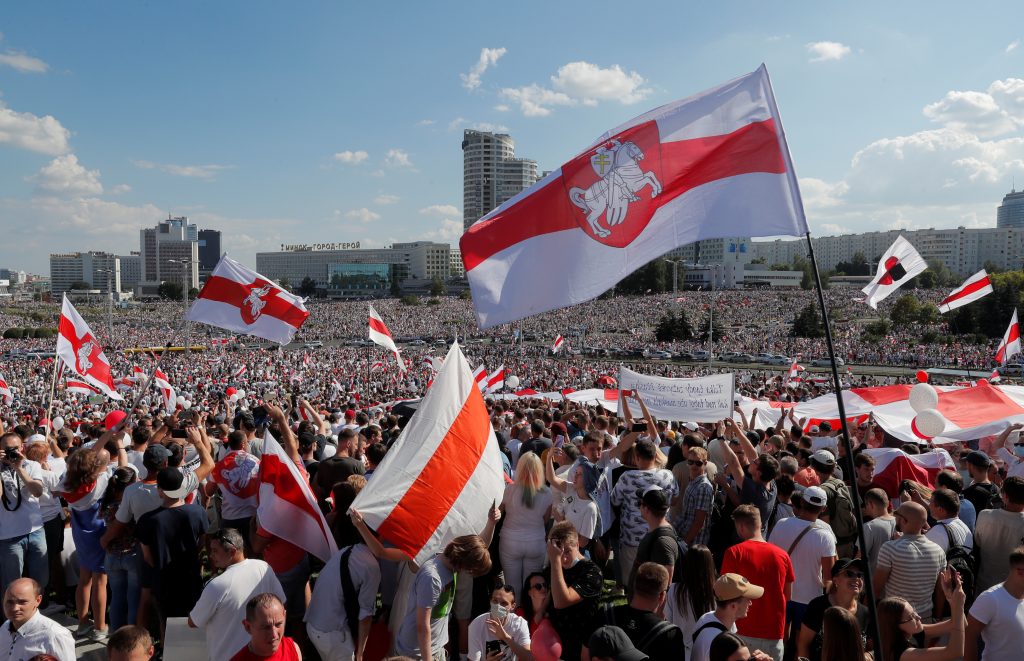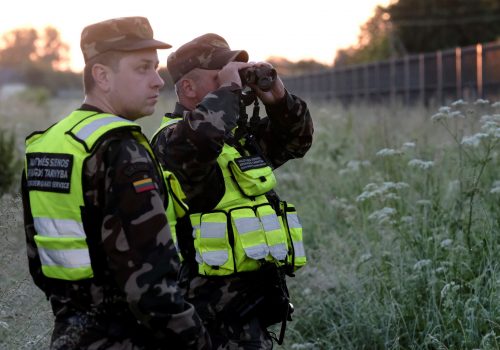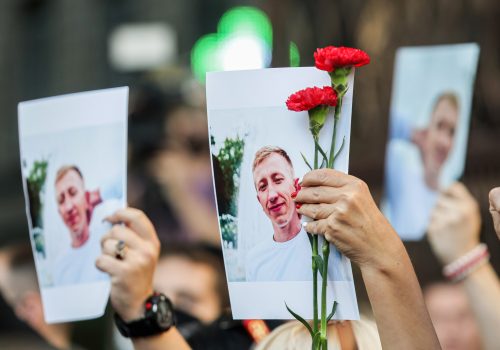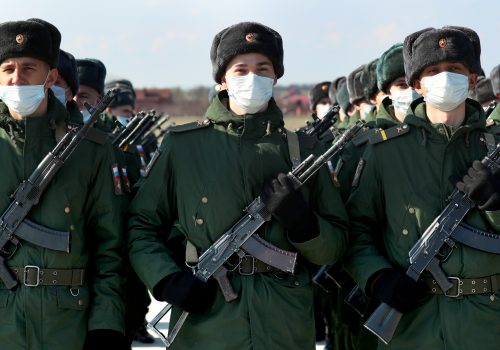On August 9, 2020, an unprecedented wave of protests swept across Belarus in the aftermath of a deeply flawed presidential election. The protects soon swelled into a nationwide pro-democracy movement that threatened to topple the regime of Belarus dictator Alyaksandr Lukashenka.
With his twenty-six year reign poised to end in disaster, Lukashenka was rescued by Russia. Vladimir Putin simply could not allow the fall of a fellow post-Soviet dictator at the hands of a grassroots democratic uprising. Instead, he dispatched planeloads of propagandists to Minsk, provided Lukashenka with a financial lifeline, and publicly declared his readiness to send Russian forces into Belarus if things got “out of control.”
Moscow’s intervention was a success and paved the way for an increasingly brutal crackdown as the Belarusian authorities sought to regain control over the restive country. By the final months of the year, mass protest rallies had been brought to an end. The scale of the repression was staggering, with tens of thousands detained and reports of grave human rights abuses becoming routine.
While the huge anti-regime protests of August, September, and October 2020 are now a distant memory, dissent has continued. Activists inside Belarus have found ever-more inventive ways of demonstrating their opposition to the authorities, while exile groups and members of the Belarusian diaspora have worked to collect evidence of regime crimes and keep the protest movement on the international agenda.
From her base in Lithuania, Belarus opposition leader Sviatlana Tsikhanouskaya has toured Western capitals tirelessly and recently secured a high-profile meeting with US President Joe Biden. Meanwhile, Lukashenka has become an international pariah whose political future depends almost entirely on the Kremlin.
One year after the first protest rallies took place across Belarus, there is no end in sight to the ongoing crisis. As long as he enjoys Russian backing and commands the loyalty of his security services, Lukashenka appears to be in no immediate danger. However, his heavy-handed crackdown of the past twelve months has alienated large swathes of the Belarusian public, and he faces a growth tide of sanctions pressure from the international community. Few expect him to remain in power indefinitely.
The dramatic events in Belarus over the past year has thrust this often overlooked country into the international spotlight. Many observers have drawn parallels with the two post-Soviet pro-democracy revolutions in neighboring Ukraine, while others have seen the protest movement as a reminder that the USSR is still collapsing. On the first anniversary of the Belarus protests, the Atlantic Council invited a range of Belarusian and international experts to share their views on how the past year has changed Belarus.
Hanna Liubakova, Nonresident Fellow, Atlantic Council: Belarusian society, or at least a large part of it, has come of age over the past year. Alyaksandr Lukashenka has managed to preserve his core support base of around 20-30% of the population, but he has also antagonized millions of Belarusians who were previously undecided or apolitical. The country as a whole passed the point of no return many months ago, and a clear majority of Belarusians are now no longer prepared to tolerate the current dictatorship.
Lukashenka still clings onto power, but his grip is more fragile than it might seem. He understands that any steps towards a relaxation of the current crackdown would rapidly lead to more mass protests with tens of thousands taking to the streets. He dare not risk even minor political events such as local elections because this could serve as a new focus for the mobilization of anti-regime sentiment. Instead, today’s Belarus exists in a state of limbo which cannot last forever.
National identity has become stronger during the past year. The historic white-red-white Belarusian national flag has gained widespread acceptance as a result of its role as a symbol of the protests. The country has also been united by the peaceful nature of the movement, which reflects a rejection of violence that runs deep in Belarusian society. Another defining feature of the protests has been the prominent role of women, who have emerged as a key driving force. This has challenged gender stereotypes in Belarusian society and transformed perceptions regarding the participation of women in political life.
While the struggle is far from over, it is already clear that Lukashenka has inadvertently laid the foundations for a future democratic Belarus. His actions over the past year have turned a critical mass of Belarusians away from authoritarianism. This makes me hopeful when I think about an eventual transition towards democracy. After the events of the past twelve months, Belarusians will never allow another tyrant to become president.
Jonathan Katz, Senior Fellow, Director Democracy Initiatives, German Marshall Fund of the United States: On the first anniversary of the fraudulent Belarusian presidential election and subsequent democratic uprising, it is hard to look beyond the ongoing struggle, human rights violations, over 600 political prisoners, and unspeakable crimes committed in Belarus and abroad by Alyaksandr Lukashenka and his illegitimate regime. This odious regime is increasingly beholden to and propped up by the Kremlin, which is conducting its own parallel domestic crackdown in Russia.
The efforts of Belarusians to seek peaceful political change after twenty-six years of authoritarianism have irreparably changed the course of their nation and shaped the policies of the US, Europe, and the wider international community towards the country. The world now views Belarus through a completely new lens.
The July 28 meeting of President Biden and Belarus opposition leader Sviatlana Tsikhanouskaya highlights the profound change in Washington’s perception of Belarusians and their democratic struggle. It sends a strong message of support for the change sought over the last year. The US, transatlantic community, and partners have responded to Belarusian needs with increased levels of assistance, diplomatic engagement, and ramped up sanctions. More of all of the above are on the way.
Change in Belarus will be led by brave Belarusians who continue to hold the line. But the continued support of the US and other partners, beyond August 9, will be needed to increase pressure and provide critical support to civic activists, independent media, and others impacted by repression.
Miriam Kosmehl, Senior Expert Eastern Europe, Bertelsmann Stiftung, Germany: Belarusian society has broken away from its prior dependency on father figure Alyaksandr Lukashenka, who shielded his subjects from dangers, real or perceived, while demanding unconditional submission in return. Large-scale public protests are not currently taking place in Belarus, but this is only due to the heinous violence deployed against protesters. Resistance to the Lukashenka regime has merely shifted its focus, especially to activities abroad.
Old divides have been overcome. This is true for opposition politicians, but also for people who previously took little interest in politics. There is a new politicization of society that clearly extends beyond activists. It is no longer true that employees of state-owned enterprises and residents of rural areas are automatically pro-Lukashenka. The only group that remains reliably behind the regime are the security forces, whose loyalty Lukashenka buys via high salaries and who fear accountability if he loses power.
There is a remarkable sense of solidarity within Belarusian society. However, as long as Lukashenka clings to power, the state apparatus will continue to subjugate society and prevent civic initiatives from taking root. Those who do not conceal their criticism will end up in prison or abroad. This makes the still pending public debate about the political future of Belarus difficult.
Maria Snegovaya, Nonresident Fellow, Atlantic Council: As we mark the one-year anniversary of the protest movement in Belarus, it is hard to avoid the conclusion that the autocratic response has been successful. During the initial months, protesters failed to seize control of the country or at least spark sufficient splits within the elite of the regime or between Lukashenka and the security forces. This allowed Lukashenka to instigate a massive crackdown on a scale previously unseen in twenty-first century Europe.
The response of the international community has not been sufficiently strong, with many of Lukashenka’s worst excesses going unpunished. This has served to embolden him further and allowed him to expand his crackdown internationally. The most blatant demonstration of the Belarus dictator’s disregard for international standards was the May 2021 forced grounding of an EU civilian flight passing through Belarusian airspace and the detention of a dissident passenger.
Events in Belarus have had gloomy consequences for Russia. Horrified by the possibility of Belarus serving as inspiration for similar anti-regime protests in Russia, the Kremlin has actively backed Lukashenka while also implementing the harshest crackdown to date against Russia’s own civil society. As a result, Russia is now following the Belarusian path, with growing numbers of independent journalists, lawyers, activists, and politicians facing arrest or being forced into exile. The West has yet to offer an adequate response to this powerful authoritarian surge triggered by the protest movement in Belarus.
Jan Pieklo, former Polish Ambassador to Ukraine: The divide separating the Belarusian people and the Lukashenka regime has become dramatically deeper. It is now crystal clear that the dictator has no interest in any form of dialog with society. Repressive measures have expanded domestically, while there is reason to believe the Belarusian KGB has also launched international operations such as the forcing down of an EU passenger jet in Belarusian airspace and the recent suspected killing of an exiled Belarusian activist in Ukraine.
Meanwhile, the Lukashenka regime continues to sponsor and organize massive illegal migration into Lithuania. Today’s Belarus serves as a testing ground for Russian hybrid warfare against the Western world. With Russia and Belarus set to hold joint military exercises in September, nearby Ukraine, Poland, and Lithuania must be ready for potential provocations.
As the protest movement in Belarus reaches the one-year landmark, perhaps the most amazing feature is the ability of Belarusians to continue demonstrating their opposition despite the brutality of the crackdown. It is also good news that Sviatlana Tsikhanouskaya has been recognized throughout the West as the legitimate leader of the democratic Belarusian opposition.
Natalia Kaliada and Nicolai Khalezin, Co-CEOs, Creative Politics Hub: The events of the past year in Belarus are best understood as a national awakening. It has been arguably the most powerful and profound transformation anywhere in Europe since the fall of communism and the end of the Cold War.
Belarusians have demonstrated their rejection of authoritarianism and have displayed remarkable courage in continuing to protest despite facing unprecedented repression. Belarusian society has shown phenomenal levels of self-organization, both domestically and among the diaspora abroad. This has made it possible to keep up the pressure on the dictatorship while also mobilizing the international community in support of Belarus’s democratic aspirations.
Another key development over the past twelve months has been the loss of Kremlin influence within Belarusian society. The Russian leadership’s decision to prop up the Lukashenka regime has radically altered attitudes within Belarus towards Russia. As a result, many Belarusians who were previously sympathetic to close ties with Russia are now inclined to view the European Union and the United States as more suitable long-term partners.
At this point, it is already obvious that there is no way back for the Lukashenka regime. The real question is what will follow, and how long the transition period from dictatorship to democracy will last.
Eurasia Center events

Brian Whitmore, Nonresident Senior Fellow, Atlantic Council: In the past year, Belarus has changed in two important ways. First, in addition to becoming even more autocratic and repressive, the regime of Alyaksandr Lukashenka has moved more decisively into Russia’s orbit. Prior to the flawed August 2020 election and Lukashenka’s brutal crackdown, the Belarusian regime was trying to keep its options open with the West. Lukashenka was resisting Moscow’s attempts to build an airbase in Belarus, distancing himself from Vladimir Putin’s conflict with the West, and attempting to be an honest broker in the war in Ukraine. Today, Lukashenka has gone all in with Putin’s Russia, has joined Moscow’s conflict with the West, is making threatening moves toward Ukraine, and appears to be ready to allow a permanent Russian troop presence.
The second important way that Belarus has changed over the past year is that civil society has become more emboldened and public opinion has become more pro-Western. Due to Putin’s support for Lukashenka, the Kremlin leader’s popularity in Belarus is declining, while ordinary Belarusians are now increasingly looking to the West for inspiration. The battle lines in Belarus are clear: the Putin-Lukashenka axis of autocrats vs the Westernizing Belarusian public.
Polina Sadovskaya, Program Director, Eurasia, PEN America: There are two realities in Belarus. One is Alyaksandr Lukashenka’s reality, where everything is centered around him and his cronies, while critics end up in jail. The other reality is that of the Belarusian people, who tolerated Lukashenka’s Belarus until August 2020 but couldn’t tolerate it anymore.
Previously, Lukashenka was known for playing both Russia and the West. The events of August 2020 showed that he cannot do that any longer, mainly because neither Europe nor the US can accept the brutal crackdown on civil society that followed the stolen Belarusian presidential election.
Belarus has now decided to play the role of rogue state similar to North Korea, Iran, or Myanmar. Not only has the Belarusian government seriously tightened its grip on civil society, jailing some 30 journalists for doing their jobs and recently moving to dissolve more than 65 human rights organizations including our sister organization PEN Belarus, but it is also making bold moves trying to block UN resolutions on restoring democracy elsewhere, as it recently did with the Myanmar resolution.
The successes achieved by opposition leader Sviatlana Tsikhanouskaya and her team, including her recent meeting with President Biden, give cause for hope that Belarus won’t ever return to the pre-August 2020 status quo, no matter how much Lukashenka may want to turn back the clock. Nevertheless, Belarusian civil society needs more support right now, both diplomatic and financial. The international community can no longer avert their eyes.
Vladislav Davidzon, Nonresident Fellow, Atlantic Council: The popular revolution that swept across Belarus a year ago has not yet succeeded in driving out the dictator who has ruled the country for more than a quarter of a century. It has, however, changed Belarus in a multitude of ways. There is clearly no going back, regardless of Lukashenka’s desire to keep Belarus permanently trapped in a reality reminiscent of the Soviet Union circa 1981.
Sadly for the dictator, a modern Belarusian political nation has taken shape over the past year, complete with its own culture, traditions, tastes, shared memories, and inside jokes. In such a situation, no matter how much force is deployed, a strongman ruler like Lukashenka without any particular ideological identity or regional power base cannot expect to rule indefinitely over a dissenting majority. It is only a matter of time before he leaves the scene.
What might a post-Lukashenka Belarus look like? Since the mid-1990s, Belarusians have been denied the opportunity to have a meaningful national debate on what kind of country they want to live in. They now have good reason to explore fundamental questions such as preferred political models, geopolitical alliances, what it means to live in Europe, and the essence of their national character. Most importantly, the people of Belarus are no longer afraid, and there can be little doubt that the majority of Belarusians want Lukashenka gone.
Peter Dickinson is Editor of the Atlantic Council’s UkraineAlert Service.
Further reading
The views expressed in UkraineAlert are solely those of the authors and do not necessarily reflect the views of the Atlantic Council, its staff, or its supporters.

The Eurasia Center’s mission is to enhance transatlantic cooperation in promoting stability, democratic values and prosperity in Eurasia, from Eastern Europe and Turkey in the West to the Caucasus, Russia and Central Asia in the East.
Follow us on social media
and support our work
Image: Hundreds of thousands attend a pro-democracy rally in central Minsk on August 16, 2020 as unprecedented numbers of Belarusians call for change following a rigged presidential vote and a brutal crackdown on protesters. (REUTERS/Vasily Fedosenko)




